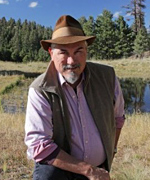 —Alan Dulaney
—Alan Dulaney
The struggle to gain legislative approval for the Lower Basin Drought Contingency Plan consumed everyone’s attention for months, but other things were quietly on the move at the same time. Water-related bills in the Legislature were unexpectedly numerous this session. Not all of these proposals advanced water management in Arizona. One of the worst is HB 2586, which alters the requirements for getting and holding an Analysis of Assured Water Supply (AWS) in Pinal County.
Developing land for subdivisions is a huge part of the Arizona economy, and each planned development must demonstrate a 100-year water supply for that subdivision. Three major instruments, plus several minor tools, comprise the Assured Water Supply program in Active Management Areas (AMAs): a Designation of AWS, a Certificate of AWS, and an Analysis of AWS.
A Designation of Assured Water Supply is held by a City or private municipal provider. ADWR evaluates each provider’s application under the AWS criteria, and Designations must be renewed on a regular schedule. When a subdivision is proposed for the provider’s service area, no Certificate is needed because the criteria for a 100-year supply have already been met. The provider remains responsible for maintaining the Designation as growth occurs — not an easy task. The number of approved Designations is a small fraction of the number of Certificates of AWS.
A Certificate of Assured Water Supply demonstrates that sufficient supplies exist to meet the demand of a subdivision for 100 years; the Certificate is tied to a specific plat. Certificates are needed outside of the service areas of Designated providers. Several criteria must be met, but physical availability is a big hurdle. If the subdivision is one phase of a master-planned community, then physical availability can be confirmed without more modeling by referring back to a previously approved Analysis of AWS.
An Analysis of Assured Water Supply demonstrates that one or more criteria for a Certificate of AWS for a subdivision have been met. Usually, this means that the physical availability of a specific volume to meet predicted demand has been established. Analyses of AWS were always meant to facilitate the phased build-out of master-plan communities by paving the way for quicker issuance of Certificates. The developer would go through the rigorous process of hydrologic modeling of groundwater supplies to prove up a specific volume. Then, instead of repeating the entire process for each individual subdivision, the Certificate for the various phased subdivisions would be based on the volume of proven supply. The Analysis would act almost like a bank account, and each Certificate would draw on that account until all phases had been completed. But each Analysis was restricted to a specific time limit, usually 10 years and generally renewable only once, and that volume of water would be reserved for the development by ADWR as long as the Analysis held, almost like a water right. And that can make an Analysis quite valuable.
HB 2586 would alter how Analyses of AWS (and thus Certificates) are done in Pinal County. The number of renewals would become limitless — no matter how much groundwater remained to meet the demands of all the Analyses and renewals already issued. The overcommitment of groundwater supplies could not be considered. ADWR also could not consider the rate of groundwater decline when evaluating any renewal, which flies in the face of future reality. While the language restricts these changes only to Pinal County, it would be very easy for any future Legislature to extend these provisions to other AMAs. This would greatly weaken the concept of an AWS.
When all the new wells in Pinal County that are contemplated in the DCP are constructed and start pumping, groundwater conditions will most certainly change. Water levels will drop. In any hydrologic model, some cells will probably turn red and go dry. Given the volumes of groundwater needed to sustain agriculture in Pinal County, these changes will be permanent, and could accelerate over time. Developers know this. HB 2586 is a flanking maneuver meant to get around the AWS rules, difficult to change in secret, by changing statute to favor developers. While the Assured Water Supply Program started almost as an afterthought in the 1980 Groundwater Management Act, it now stands as a centerpiece of good water management. Any attack on it is bad water policy and detrimental to the economy of Arizona.